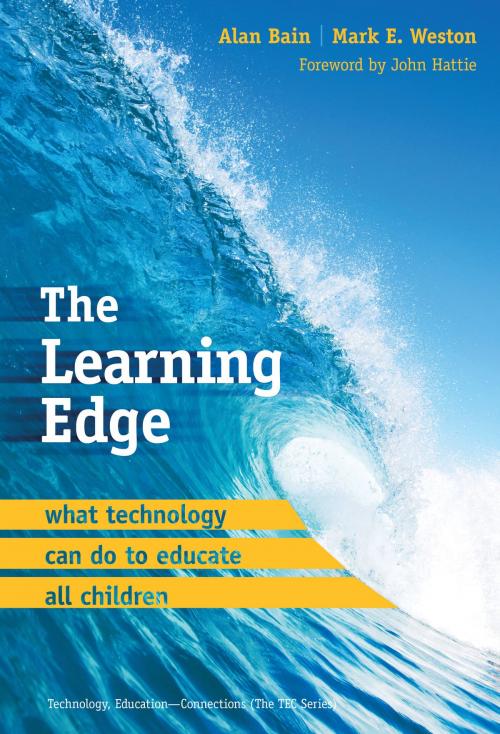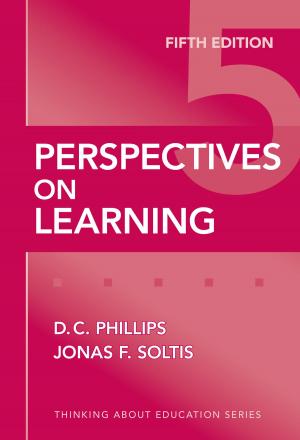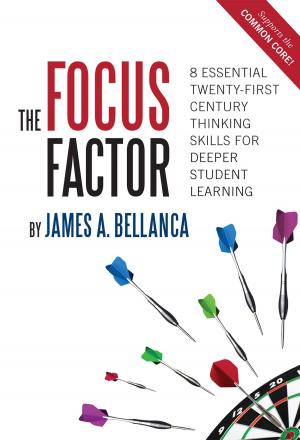The Learning Edge
What Technology Can Do to Educate All Children
Nonfiction, Reference & Language, Education & Teaching| Author: | Alan Bain, Mark E. Weston | ISBN: | 9780807770894 |
| Publisher: | Teachers College Press | Publication: | December 15, 2009 |
| Imprint: | Language: | English |
| Author: | Alan Bain, Mark E. Weston |
| ISBN: | 9780807770894 |
| Publisher: | Teachers College Press |
| Publication: | December 15, 2009 |
| Imprint: | |
| Language: | English |
“Using technology to create bottom-up, emergent innovation is a novel, important model for educational transformation.”
—Chris Dede, Wirth Professor in kearning Technologies, Harvard University
“Bain and Weston show that when teachers ‘perceive’ technologies as part of their teaching and part of students learning there can be greater gains to both surface and deep understanding. . . . The stories are compelling reading and they lead to a ‘Why not do it here’ sense for me as the reader.”
—From the Foreword by John Hattie, director, Melbourne Education Research Institute, University of Melbourne, and author of Visible Learning
After billions of dollars, thousands of studies, and immeasurable effort by educators at all levels, why is the performance of students and teachers so unaffected by technology? Moreover, what should be done to extract genuine benefit from the information and communication technology (ICT) revolution? In this groundbreaking book, technology and education experts Alan Bain and Mark Weston provide research-based evidence for how the widespread application of ICT can provide powerful learning opportunities that lead to lasting gains and achievement. They show how the integrated use of technology at all levels of the educational system can greatly expand collaborative learning opportunities by giving all educational stakeholders powerful problem-solving tools and solutions. The approaches presented here are grounded in over twenty years of experience working with classroom teachers, school leaders, association members, and policymakers.
Book Features:
- A strategic blueprint for using commonly available technology tools to drive measurable and sustainable change in education.
- Vignettes of classrooms and schools successfully using technology across the curriculum.
- A solutions-oriented presentation, including practical examples of alternative courses of action at all levels of the education system.
- A concluding section at the end of each chapter that summarizes key ideas.
Alan Bain is Sub-Dean Curriculum and Faculty Development in the Faculty of Education at Charles Sturt University in Bathurst, New South Wales, Australia. Mark E. Weston is a global education strategist at Dell Inc. in Atlanta, Georgia.
“Using technology to create bottom-up, emergent innovation is a novel, important model for educational transformation.”
—Chris Dede, Wirth Professor in kearning Technologies, Harvard University
“Bain and Weston show that when teachers ‘perceive’ technologies as part of their teaching and part of students learning there can be greater gains to both surface and deep understanding. . . . The stories are compelling reading and they lead to a ‘Why not do it here’ sense for me as the reader.”
—From the Foreword by John Hattie, director, Melbourne Education Research Institute, University of Melbourne, and author of Visible Learning
After billions of dollars, thousands of studies, and immeasurable effort by educators at all levels, why is the performance of students and teachers so unaffected by technology? Moreover, what should be done to extract genuine benefit from the information and communication technology (ICT) revolution? In this groundbreaking book, technology and education experts Alan Bain and Mark Weston provide research-based evidence for how the widespread application of ICT can provide powerful learning opportunities that lead to lasting gains and achievement. They show how the integrated use of technology at all levels of the educational system can greatly expand collaborative learning opportunities by giving all educational stakeholders powerful problem-solving tools and solutions. The approaches presented here are grounded in over twenty years of experience working with classroom teachers, school leaders, association members, and policymakers.
Book Features:
- A strategic blueprint for using commonly available technology tools to drive measurable and sustainable change in education.
- Vignettes of classrooms and schools successfully using technology across the curriculum.
- A solutions-oriented presentation, including practical examples of alternative courses of action at all levels of the education system.
- A concluding section at the end of each chapter that summarizes key ideas.
Alan Bain is Sub-Dean Curriculum and Faculty Development in the Faculty of Education at Charles Sturt University in Bathurst, New South Wales, Australia. Mark E. Weston is a global education strategist at Dell Inc. in Atlanta, Georgia.















